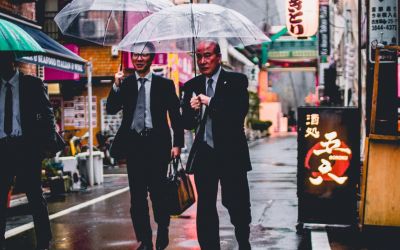
A Cry from the Next Generation of Japanese Pharmaceutical Executives
As my meeting with the HR director at a leading American pharma company in Japan drew to a close, he asked if I thought that young Japanese managers would be interested in international assignments. He explained that he had brought this matter up with HQ a number of times, and the general consensus was that young Japanese people would only be interested in going to Europe or the United States.
He acquainted me with the generally held belief by HQ that the Japanese live in a “Sakoku Paradise” (Sakoku was the closed-door policy adopted by the historical Tokugawa shogunate in handling their relationships with foreign countries). He went on to clarify that there is a widely held belief that Japan’s predominately monocultural society doesn’t lend itself to dynamic, globally minded business men and women, but instead produces what some have called “herbivores,” metrosexuals who are more concerned with looks than career. According to HQ, the image of Japanese women was just as damning, suggesting that most were “parasite singles” (parasaitoshinguru), single people who live with their parents until their early 30s in order to enjoy a carefree and comfortable life.
I was a little taken aback by the character assassination of the younger generation of pharma professionals. I responded that my experience supported a contrary view; the most common question I’m asked by the younger demographic concerns how they can get access to international opportunities.
The HR director agreed with my view, and we thought that we’d put our theory to the test. We asked a group of 100 pharmaceutical professionals aged between 27 and 35 to complete a short survey. In the survey, our group was asked whether their company offered them a clear career path over the next five years. Alarmingly, 77% said that there was no such guidance.
When asked whether they would be interested in leaving their current company and joining another pharma company if it offered them a one-year International training program, 81% responded positively.
When asked where they would be willing to live, 40% said that they would be interested in opportunities in China, nearly 30% said Vietnam was attractive, 25% indicated that Brazil and Russia would provide valuable opportunities, and nearly 20% said that they would live in India for career advancement. A large majority (70%) said Singapore would be ideal. One responder commented that “the US FDA will remain the most powerful agency in the world: the benefit of training in other countries is not clear.”
We asked our group what factors they took into consideration when thinking about their careers. One responder listed the following: “What I can learn as business skills/knowledge from company assets”; “Whom I can work/connect with as colleagues and/or customers”; and “How I can contribute to society.” Nearly 100% said that career advancement was at the forefront of their minds, which rings alarm bells when we consider that most felt they didn’t have a definite career plan. Salary was a key factor at 77%, while location was most important to 66%, and the company’s product pipeline resonated with 40% of the group. Having a mentor was seen as an important factor to 22% of the group. One responder wanted a career that would empower him to ascend to office in Japan.
The results of our short survey show that young employees at pharmaceutical companies in Japan are crying out for leadership and opportunities. This may indicate a great opening for a forward-thinking company to invest in the next generation of go-getters. Perhaps the bias of the senior members of HQ is a reflection of themselves rather than a true description of the under-35 demographic in Japan. It appears that in some companies, HQ may be out of step with the hearts and minds of the next generation of Japanese executives. I know of at least one Japanese executive who resigned in part due to the lack of commitment shown by his foreign boss with regards to training and career development of the up-and-coming stars in Japan. Where there is discourse within a labor market, therein lies a great opportunity. As Stephen R. Covey (author of The 7 Habits of Highly Effective People) explains, “An empowered organization is one in which individuals have the knowledge, skill, desire, and opportunity to personally succeed in a way that leads to collective organizational success.”
Written by Philip Carrigan, (Pharma, Medical Device Recruiter Japan). Connect with me on LinkedIn.
Morunda www.morunda.com should be your choice of recruiting partner in Japan and Asia Pacific. Why? Because we live and breathe the pharmaceutical industry in Asia and the Pacific—we’re specialists!
Morunda has completed over 400 managers to director-level placements since 2001.
A cultural understanding of what it takes to secure top talent.
Over one hundred thought leadership articles published.
We hold regular seminars for candidates and clients alike with industry experts.
We understand the market, not only today, but where it is heading in the next 12 to 18 months.
Through our extensive contacts with the best, brightest, and most well-prepared candidates in the market, combined with the ability to fully understand our clients’ needs, we can quickly provide the perfect solution to your requirements. Get in touch today by emailing contact@morunda.com.
Recent Posts
- Top sporting coaches and business leaders have a lot in common
- Elevating Leadership: Insights from Japan’s healthcare sector
- How to be a country manager
- Here are four things your firm can do to attract and retain top talent in Japan’s pharmaceutical and medical device industry:
- Build a Strong Employer Brand – What can you do if your company stinks?


